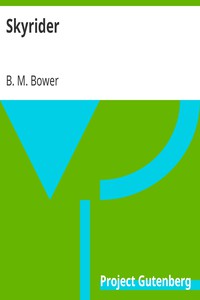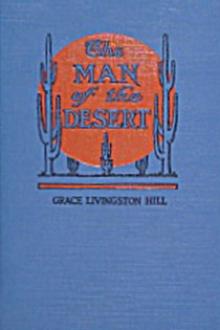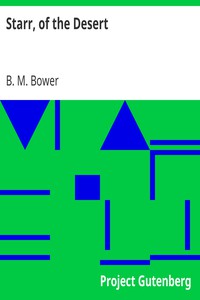Skyrider, B. M. Bower [positive books to read txt] 📗

- Author: B. M. Bower
Book online «Skyrider, B. M. Bower [positive books to read txt] 📗». Author B. M. Bower
Johnny thrust out a foot and gently kicked the flattened tire on one wheel. "Umh-humh," he muttered to himself. "Flat tire." Never in his life had Johnny enjoyed the privilege of kicking a wheel on the landing gear of an airplane, but you would have thought that this was his business, and that it bored him intensely to do so. He took one hand off his hip long enough to lift the drooping wing that canted toward the south. "Mhm-hmh—busted skid," he observed, in a tone which, to the brother of Tomaso, shaved several dollars off the coveted fifty. Close behind Johnny he stayed, following him around the plane in a secret agony of apprehension.
Johnny, primed by the two rides he had taken—for a price—the fall before, stepped nimbly up and straddled into the pilot's seat. He found out, by actual experimentation, what wires tilted the ailerons, which ones operated the elevators. "Mhm-hmh—dep control here," he commented; whereupon the brother of Tomaso squirmed, thinking Johnny had discovered a fatal flaw somewhere.
With one eye still squinted against cigarette smoke that did not rise, Johnny climbed out and walked back along the fuselage to the tail. "Mhm-hmh—I thought so!" he ejaculated, staring severely at the elevators. "This is bad—pret-ty darn bad! They musta done a tail-slide and pancaked. That's ba-ad." He removed the smokeless cigarette from his lips, looked at it, felt for a match, and shook his head slowly while he drew the match across a hot rock at his feet.
"Jus' broke little small," Tomaso's brother's voice came pleadingly from behind Johnny. "You can feex him easy. She's fine airship, you bet!"
Johnny turned and looked at him pityingly. "Say, where do you get that stuff?" he inquired. "A hell of a lot you know about airships—bringing me off down here to see this! Say! where's the fuselage at?" he abruptly demanded.
Tomaso's brother gazed at the machine with tragic eyes. "Me, I'm seen it here ontil this time I come," he declared virtuously. "I'm not touch notheeng. That fuz'lawge, she's right here las' time I'm here. I'm not touch notheeng but one little small hammer, one pliers. You find him up there, I bet." Tomaso's brother pointed to the pilot's seat.
"Hunh! a lot you know about it!" snorted Johnny, and turned and walked away to the other side of the machine where Tomaso's brother could not see him grin.
"No matter what kind of a cheese you are, you must know an airplane can't fly without a fuselage," he grumbled to the unhappy brother of Tomaso. "Without that the plane's no good to me or anybody else. You better get busy and hunt it up."
Tomaso's brother tied the horses to the nearest bush and got busy, volubly protesting all the while that he had not touched a thing, and that if Tomaso really had carried off the fuz'lawge, he would presently make that young devil wish he had never been born.
"Maybe the aviators dropped it back there on the edge of the basin when they were coming down," Johnny suggested, and laid himself down in the shade of the plane to smoke and dream and gloat. He felt that he would burst into insane and costly whoops if he attempted another minute's repression. And he knew that Tomaso's brother would bleed him of his last dollar if he guessed one half of Johnny's exultation; wherefore the ruse to send Tomaso's brother off on a senseless quest.
"Oh, golly! Oh-h, good golly!" he murmured ecstatically, his eyes taking in the full sweep of the great wings. "It's too good to be true. No, it ain't; it's too good not to be true! You wait. I'll show the Rolling R bunch—you wait!"
He rolled to an elbow and looked back along the fuselage to the tail, his eyes dwelling fondly on the clean lines of her, the perfect symmetry, the glossy, unharmed covering. His glance went farther, to where the brother of Tomaso plodded toward the basin's rim, peering here and there, pausing to look under a bush, swerving to make sure the lost fuselage was not behind a rock.
Johnny's grin widened. Presently it exploded into a laugh, which he smothered with both hands clapped over his mouth. He writhed and kicked and rolled in the sand. His round, blue eyes grew moist with the tears of a boy's exuberant mirth. From behind his palms came muffled who-who-who-oo-oos of laughter.
He believed that he was laughing at the trick he had played on Tomaso's brother. He was doing more than that: he was making up for all the sober longing, for all the fears and the discouragements of his barren life. There had been so much hoping and sighing and futile wishing—it had been so long since Johnny Jewel had really laughed—and he was young, and youth is the time of carefree laughter. Now nature was striking a balance for him.
Tomaso's brother went up over the rim of the basin, disappeared, and then came plodding back through the heat. Johnny had laughed all that while; laughed until his sides were sore; until his eyes were red with the tears he had shed; until he was so weak he staggered when he first crawled out from under the plane and stood up. But it did him good, for all that, to have laughed so hard and so long over an impish trick that came from the boy in him.
"Me, I don't find him that damn fuz'lawge," said the brother of Tomaso, wiping his swarthy countenance that was beaded with sweat. "That Tomaso, he has took, I bet. He brings it to you queeck when I'm through with him." He looked at Johnny expectantly. "I'm promise you it comes back all right, if perhaps Tomaso has take. Perhaps now you pay twenty-fi' dollar?"
"No, I don't; I pay you ten dollars now." Johnny, remember, had a full two days' acquaintance with the brother of Tomaso. He was taking a certain precaution, rather than an unfair advantage. He honestly believed that the brother of Tomaso was best dealt with cautiously.
"When this airplane is safe at Sinkhole, and you've brought me every darned thing that's been packed off, I'll pay you the rest of the fifty. There's more," he added meaningly, "that's missing. The fuselage ain't all."
The brother of Tomaso seemed unhappy. He took the ten dollars with a sigh, promised himself much unpleasantness for Tomaso, and wearily set about making camp, too dispirited to care that Johnny spent the time in fussing around the machine, making a thin pretense of looking it over for breakages and defects when all the while he was simply adoring it.
"At daybreak," Johnny announced with a new dignity in his voice—the dignity of one having valuable possessions and a potential power—"we'll start back. But I don't think much of your idea that we can drag this machine home with our saddle horses. We can't—not and have anything but a bundle of junk when we get there. There's a ranch over south here, a mile or so. Better see if you can't get a wagon and team. We'll have to haul it home somehow."
The brother of Tomaso started perceptibly. "A rancho? But that is not possible, señor!"
"Oh, ain't it? I'll show yuh, then."
"Oh, no! No importa. If it is a rancho in this countree, me, I'm find it without trobles for you."
Even Johnny's absorption in his treasure-trove could not altogether blind him to the fact that Tomaso's brother was perturbed. He wondered a little. But after all, there was only one thing now that really interested him, and he straightway returned to it, leaving the Mexican to find the ranch and hire a team. He was not afraid that the brother of Tomaso would fail him in that detail. Thirty American dollars look big to a Mexican.
He knew when Tomaso's brother mounted and rode away in the direction of the ranch, and he knew when he returned. But he failed to observe that the brother of Tomaso was gone long enough to have crawled there and back on his hands and knees, and that he returned in a much better humor than when he had left.
"The wagon and mules, it will come at daytime," was his brief report. He crawled into his blankets and left Johnny perched up in the pilot's seat, planning and dreaming in the moonlight. The brother of Tomaso lifted his head once and looked at Johnny's head and shoulders, which was all of him that showed. Through half-closed lids he studied Johnny's profile and the look of exaltation in his wide-open eyes.
"Tex, he's one smart hombre," Tomaso's brother paid tribute. "The plan it works aw-right, I bet."
CHAPTER EIGHT OVER THE TELEPHONEThat night Johnny spread his blankets in a spot where he could lie and look at his airplane with the moon shining full upon it and throwing a shadow like a great, black bird with outstretched wings on the sand. He had to lie where he could look at it, else he could not have lain there at all. He was like a child that falls asleep with a new, long-coveted toy clasped tight in its two hands. He worried himself into a headache over the difficulties of transporting it unharmed over the miles of untracked desert country to Sinkhole. He was afraid the mules would run away with it, or upset it somehow. It looked so fragile, so easily broken. Already the tail was broken, where the flyers in landing had swerved against a rock. He pictured mishaps and disasters enough to fill a journey of five times that length over country twice as rough. He wished that he could fly it home. Picturing that, his lips softened into a smile, and the pucker eased out of his forehead.
But he couldn't fly it. He didn't know how, though I honestly believe he would have tried it anyway, had there been even a gallon of gasoline in the tank. But the tank was bone dry, and the tail was knocked askew, so Johnny had to give up thinking about it.
When he slept, the airplane filled his dreams so that he talked in his sleep and wakened the brother of Tomaso, who sat up in his blankets to listen.
"That plan, she's work fine, I bet!" grinned the brother of Tomaso when Johnny had droned off into mumbling and then silence. "That Tex, she's smart hombre." He laid himself down to sleep again.
Speaking of Tex; that same night he lay awake for a long while, staring at the moon-lighted window and wishing that his eyesight could follow his thoughts and show him what he wanted to see. His thoughts took the trail to Sinkhole, dwelt there for a space in anxious speculation, drifted on to the Border and beyond and sought out Johnny Jewel, dwelling upon his quest with even more anxious speculation. Then, when sleep had dulled somewhat his reasoning faculties, Tex began to vision himself in Tucson—well, perhaps in Los Angeles, that Mecca of pleasure lovers—spending money freely, living for a little while the life of ease and idleness gemmed with the smiles of those beautiful women who hover gaily around the money pots in any country, in any clime.
For a hard-working cowpuncher with no visible assets save his riding gear and his skill with horses, the half-waking dreams of Tex were florid and as impossible, in the cold light of reason, as had been the dreams of Johnny Jewel in that bunk house.
That night others were awake in the moonlight. Down at Sinkhole camp five or six riders were driving a bunch of Rolling R horses into the corral where Johnny kept his riding horse overnight. They were not dreaming vaguely of the future, these riders. Instead they were very much awake to the present and the risks thereof. On the nearest ridge that gave an outlook to the north, a sentinel was stationed in the shade of a rocky out-cropping, ready to wheel and gallop back with a warning if any rode that way.
When the horses were corralled and the gate closed, one man climbed upon the fence and gave orders. This horse was to be turned outside—and





Comments (0)